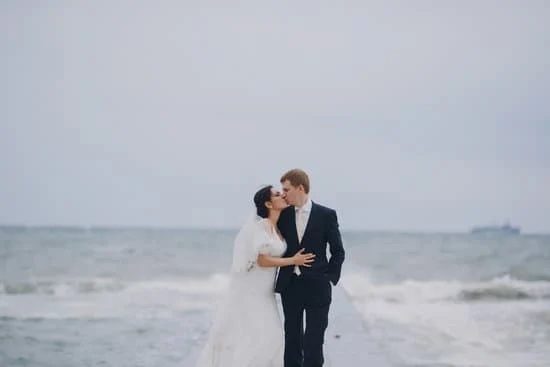Who is supposed to pay for the wedding? This age-old question has been a topic of debate and discussion for many couples as they navigate the complexities of planning their special day.
The tradition of wedding expenses has evolved over time, with modern trends in wedding financing challenging long-held beliefs about who is responsible for covering the costs. From the role of the bride’s family to financial etiquette for destination weddings, there are various factors to consider when it comes to determining who pays for the wedding.
Traditionally, the bride’s family has taken on the financial responsibility of paying for the wedding. This tradition dates back to ancient customs where a dowry was provided by the bride’s family to ensure her security and happiness in marriage. However, as societal norms and expectations have shifted, modern couples are exploring new ways to finance their weddings, challenging this traditional practice.
In addition to the bride’s family, the groom’s family also plays a significant role in contributing financially to the wedding. While traditions may vary depending on cultural and religious backgrounds, it is common for both families to come together and share the financial burden of hosting a wedding. Couples themselves may also contribute by covering certain expenses, while members of the wedding party are often expected to take on specific financial responsibilities as well.
Modern Trends in Wedding Financing
As society and traditions evolve, so do the ways in which weddings are financed. In modern times, it is becoming more common for couples to share the financial responsibility of their wedding. This can be attributed to a variety of factors such as changing social norms, financial independence of couples, and a desire for equality in decision making.
Research shows that 62% of couples today contribute to the cost of their wedding, with many either paying for the entire celebration themselves or splitting expenses with their families. This shift in financial responsibility often reflects the changing dynamics of relationships and the desire for both parties to have an equal say in how their special day is planned and executed.
Furthermore, some couples choose to take out personal loans or use credit cards to finance their wedding. While this trend allows couples more control over their day, it also comes with its own set of challenges, such as potential debt and financial strain. Additionally, some individuals opt for creative financing options such as crowdfunding or seeking sponsorships from local businesses to help offset costs.
| Wedding Financing Trends | Data |
|---|---|
| Couples contributing to wedding costs | 62% |
| Use of personal loans or credit cards | Increasing trend |
| Creative financing options (crowdfunding, sponsorships) | Rising popularity |
Role of the Bride’s Family in Paying for the Wedding
Traditionally, the bride’s family has often taken on a significant financial burden when it comes to paying for wedding expenses. This tradition stems from the idea that the bride’s family is responsible for hosting the wedding and providing for their daughter’s new life with her spouse. However, with changing societal norms and financial dynamics, the role of the bride’s family in financing a wedding has evolved.
Changing Dynamics
In modern times, many couples are opting to share or completely take on the financial responsibilities of their weddings. This shift is often due to factors such as financial independence, egalitarian values, and practicality. As a result, the pressure on the bride’s family to foot the bill for a lavish wedding has lessened.
Modern Contributions
Despite these changes, it is not uncommon for the bride’s family to still contribute financially to their daughter’s wedding – sometimes in accordance with their means and willingness. Their contributions can vary from covering specific expenses like the venue or catering to providing an overall budget for the couple to work within.
In some cases, they may also opt to contribute non-monetary resources such as heirloom jewelry or offering assistance with planning and logistics. Ultimately, how much the bride’s family contributes financially depends on their individual circumstances and cultural expectations.
Navigating Expectations
Navigating traditional expectations surrounding who is supposed to pay for a wedding can be challenging. It is essential for couples and both sets of families to have open conversations about financial matters early on in the wedding planning process.
By discussing expectations and contributions openly and honestly, couples can avoid misunderstandings and put together a plan that aligns with everyone’s capabilities and desires. These discussions may also involve finding compromises or alternative solutions that respect cultural or familial traditions while also accommodating modern realities.
Role of the Groom’s Family in Paying for the Wedding
Traditionally, the groom’s family has been expected to contribute financially to the wedding expenses. This can include covering certain aspects of the wedding, such as the rehearsal dinner, the groom’s attire, and even some of the overall wedding costs. While this tradition may have been more common in the past, modern trends in wedding financing have seen a shift in these expectations.
In many modern weddings, the role of the groom’s family in paying for the wedding has become more flexible. Some couples choose to divide the expenses between both families, while others opt to cover the costs themselves. Additionally, there are situations where neither family is able or willing to contribute financially, and as a result, the bride and groom carry the entirety of the financial burden themselves.
Despite these changes in trends, there are still instances where the groom’s family takes on a significant financial responsibility for certain aspects of the wedding. This often includes hosting and paying for the rehearsal dinner, which traditionally brings together close friends and family members before the main event. However, it is important to acknowledge that every wedding is unique and may require different financial arrangements based on individual circumstances.
The Expenses Covered by the Bride and Groom Themselves
When it comes to wedding expenses, the burden is not solely on the families of the bride and groom. In modern times, couples are increasingly taking on some, if not all, of the financial responsibility for their wedding. This shift reflects changes in societal norms and expectations, as well as an increase in couples getting married at an older age when they are likely more financially independent.
The bride and groom typically cover costs such as the engagement ring, wedding bands, marriage license, officiant fees, and their attire for the big day. They may also choose to contribute to other expenses, such as the venue rental, flowers, photography/videography, and transportation. It is important for couples to have an open discussion about their individual financial situations and how much they are willing or able to contribute to these costs.
According to a survey by The Knot Real Weddings Study 2019, on average couples contributed 45% of the total cost of their wedding from their own savings. It is essential for the bride and groom to establish a budget early on in the planning process and determine what expenses they will take on themselves. This will help avoid any misunderstandings or disagreements down the line about who is supposed to pay for what.
| Wedding Expense | Percentage Typically Covered by Couple |
|---|---|
| Engagement Ring | 100% |
| Marriage License | 100% |
| Wedding Attire | 100% |
Financial Considerations for the Wedding Party
When it comes to planning a wedding, it’s not just the bride and groom who have financial considerations to navigate. The wedding party, which typically includes bridesmaids, groomsmen, and other close friends and family members, also needs to consider their own budgets and expenses. Here are some financial considerations for the wedding party:
- Attire: Wedding party members are usually responsible for purchasing their own attire for the big day. This can include dresses and suits, as well as accessories such as shoes, jewelry, and hair and makeup.
- Travel and Accommodations: Depending on the location of the wedding, members of the wedding party may need to travel and secure accommodations for the event. This can be a significant expense, especially for destination weddings.
- Gifts: It is customary for members of the wedding party to give a gift to the couple. This can add another financial burden, especially if they are already spending money on attire, travel, and accommodations.
It’s important for couples to be mindful of these financial considerations when asking friends and family members to be part of their wedding party. While it’s an honor to be included in such a special day, it’s also important to be considerate of the financial strain it may put on those involved.
Ultimately, open communication about budget expectations between couples and their wedding party is essential. Couples should be understanding if someone in their wedding party expresses concerns about costs associated with being a part of the celebration. It’s important that everyone feels comfortable expressing their financial limitations without feeling guilty or ashamed.
Financial Etiquette for Destination Weddings
Destination weddings can be a dream come true for many couples, but they often come with a hefty price tag. When it comes to financial etiquette for destination weddings, there are a few key considerations to keep in mind.
Guest Expenses
For destination weddings, it’s important to remember that guests will incur additional expenses beyond just the wedding gift. These can include travel costs, accommodation, and possibly even time off work. It’s crucial for couples planning a destination wedding to be mindful of these expenses and considerate of their guests’ financial situations.
Communication
When planning a destination wedding, clear and open communication about the financial expectations is essential. Couples should provide their guests with as much information as possible about the anticipated costs and any potential group discounts for travel or accommodation. Additionally, couples should understand that not all guests may be able to afford the expense of attending a destination wedding and should respect their decision.
Financial Contributions
In some cases, couples may choose to cover certain expenses for their guests as part of the destination wedding experience. This could include hosting welcome dinners or activities for guests during their stay. However, it’s important for couples to carefully consider their budget and not feel obligated to cover every expense for their guests. Ultimately, attendees should be prepared to cover their own travel and accommodation costs for a destination wedding.
When it comes to financing etiquette for destination weddings, consideration and communication are key. By being mindful of guest expenses, communicating openly with attendees about financial expectations, and considering options for providing additional support where possible, couples can navigate the delicate balance of ensuring everyone feels included while also respecting individual financial circumstances.
Solutions for Couples Struggling With Wedding Costs
Planning a wedding can be an expensive endeavor, and many couples find themselves struggling to cover the costs associated with the big day. Fortunately, there are a variety of solutions available for couples facing financial challenges when it comes to their wedding.
One common solution for couples struggling with wedding costs is to create a budget and stick to it. This may involve making some difficult decisions about where to allocate funds and finding creative ways to save money on various aspects of the wedding, such as choosing a less expensive venue or opting for DIY decorations. By carefully managing their budget, couples can ensure that they stay within their financial means while still having the wedding of their dreams.
Another option for couples facing financial difficulties is to consider alternative sources of funding. Some couples may choose to take out a personal loan or seek financial assistance from family members.
Others may explore crowdfunding options or consider downsizing other areas of their life in order to free up funds for their wedding. It’s important for couples to carefully weigh the pros and cons of each potential solution and make decisions that are in line with their long-term financial goals.
In some cases, couples may also choose to postpone their wedding in order to save up additional funds or reevaluate their priorities. While it can be disappointing to delay such an important milestone, taking the time to build up savings and plan more carefully can ultimately result in a more financially stable and stress-free start to married life.
Ultimately, every couple’s situation is unique, and it’s important for them to consider all available options when navigating the complexities of paying for their wedding.
Navigating Cultural and Religious Expectations for Wedding Expenses
In conclusion, the question of who is supposed to pay for the wedding can be a complex and sometimes sensitive one, as it often involves navigating traditions, modern trends, financial considerations, and cultural or religious expectations. While tradition may dictate the bride’s family as the primary contributor to wedding expenses, modern trends have seen a shift towards more equitable financing between both families and the couple themselves.
It is important for couples to have open and honest conversations about wedding finances, considering their respective financial situations and potential parental contributions. Whether it’s adhering to cultural or religious expectations or breaking away from traditional norms, the key is for all parties involved to come to a mutual understanding and agreement on how wedding expenses will be handled.
Ultimately, there are no hard and fast rules when it comes to who should pay for the wedding. Each couple and their families will need to consider their unique circumstances and make decisions that are best for them. By approaching the topic with sensitivity, clear communication, and respect for differing customs or beliefs, couples can navigate wedding expenses in a way that aligns with their values and priorities.
Frequently Asked Questions
What Is the Groom’s Family Supposed to Pay For?
The groom’s family traditionally pays for certain expenses related to the wedding, such as the rehearsal dinner, corsages for the mothers and grandmothers, and the officiant’s fee. These are longstanding traditions that may vary depending on cultural or regional customs.
Who Pays for the Wedding Traditionally?
Traditionally, the costs of the wedding are divided between the bride’s family and the groom’s family. The bride’s family typically covers expenses like the ceremony venue, flowers, reception, and catering, while the groom’s family is responsible for aspects like the rehearsal dinner and alcohol for the reception.
Does the Father of the Bride Have to Pay for the Wedding?
While it was once tradition for the father of the bride to bear most of the financial burden for his daughter’s wedding, societal norms have shifted over time. Today, financial responsibilities are often more evenly distributed among both families or handled by the couple themselves.
However, some fathers still choose to contribute substantially as a way of showing their support and love for their daughter on her special day.

Welcome to my blog about home and family. This blog is a place where I will share my thoughts, ideas, and experiences related to these important topics. I am a stay-at-home mom with two young children. I hope you enjoy reading it! and may find some helpful tips and ideas that will make your home and family life even better!





